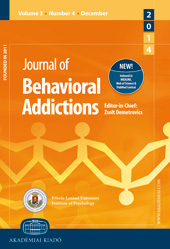Response to Cognitive Impulsivity and the Behavioral Addiction Model of Obsessive–Compulsive Disorder: Abramovitch and Mckay (2016)
Response to Cognitive Impulsivity and the Behavioral Addiction Model of Obsessive–Compulsive Disorder: Abramovitch and Mckay (2016)
Author(s): Giacomo Grassi, Martjin Figee, Paolo Stratta, Alessandro Rossi, Stefano PallantiSubject(s): Cognitive Psychology, Behaviorism, Substance abuse and addiction
Published by: Akadémiai Kiadó
Keywords: OCD; impulsivity; behavioral addiction;
Summary/Abstract: In our recently published article, we investigated the behavioral addiction model of obsessive–compulsive disorder (OCD), by assessing three core dimensions of addiction in patients with OCD healthy participants. Similar to the common findings in addiction, OCD patients demonstrated increased impulsivity, risky decision-making, and biased probabilistic reasoning compared to healthy controls. Thus, we concluded that these results support the conceptualization of OCD as a disorder of behavioral addiction. Here, we answer to Abramovitch and McKay (2016) commentary on our paper and we support our conclusions by explaining how cognitive impulsivity is also a typical feature of addiction and how our results on decision-making and probabilistic reasoning tasks reflect cognitive impulsivity facets that are consistently replicated in OCD and addiction.
Journal: Journal of Behavioral Addictions
- Issue Year: 5/2016
- Issue No: 3
- Page Range: 398-400
- Page Count: 3
- Language: English

